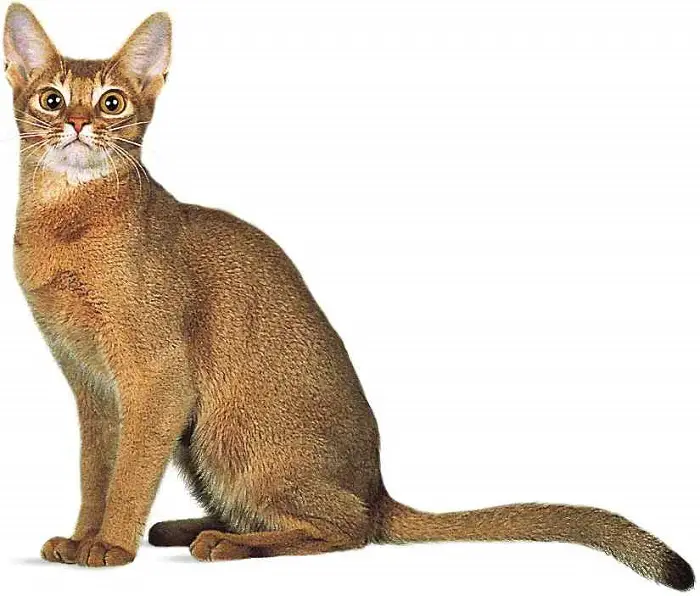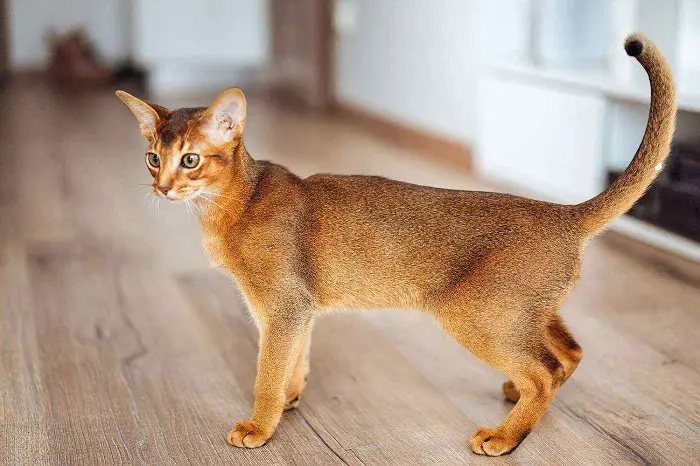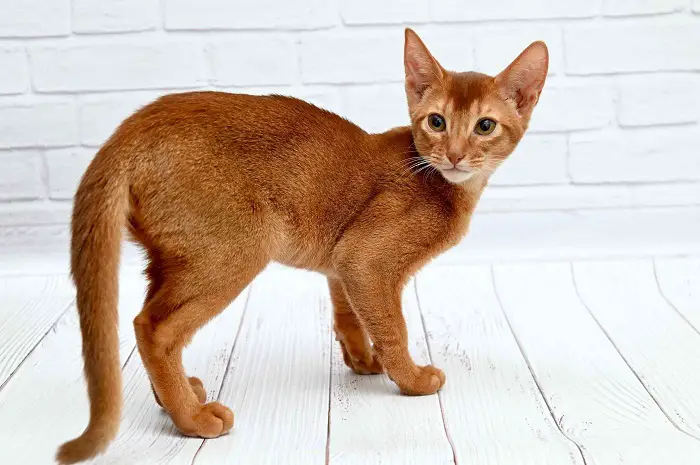The Abyssinian cat is a popular domestic cat breed known for its striking appearance and playful nature. It is one of the oldest known cat breeds and is believed to have originated in ancient Egypt. The breed’s name, “Abyssinian,” comes from the Abyssinia region, present-day Ethiopia.
Abyssinians have a medium-sized, muscular body with a graceful and elegant build. They have a short, dense coat that lies close to the body and is characterized by a ticked or agouti pattern. The individual hairs are banded with different colors, giving the coat a shimmering effect. The most common color is a reddish-brown or ruddy coat, but Abyssinians also come in blue, brown, and fawn colors.
Origin and History of Abyssinian Cats
The origin and history of the Abyssinian cat breed are still being determined, as it is an ancient breed with a long lineage. However, there are several theories and legends surrounding its origins.
One theory suggests that the Abyssinian cat originated from the sacred cats of ancient Egypt. The resemblance between the Abyssinian and depictions of cats found in ancient Egyptian art, such as those seen in murals and statues, has led to this belief. Some believe that traders brought the breed’s ancestors from Egypt to Abyssinia (modern-day Ethiopia), hence the name “Abyssinian.”
Another theory suggests that the breed originated in Southeast Asia, particularly along the coast of the Indian Ocean. According to this theory, the cats were transported by traders and explorers to various parts of the world, including Abyssinia, where they eventually became established.
The first documented appearance of the Abyssinian cat in the Western world occurred in the late 19th century. A British soldier named Captain Barrett-Lennard is credited with bringing an Abyssinian cat named “Zula” from Abyssinia to England in 1868. Zula became the foundation cat for the breed in England, and her descendants played a crucial role in establishing the breed’s characteristics.
The breed gained popularity in the early 20th century, and breeding programs were established to preserve and develop the Abyssinian’s unique appearance and temperament. The breed was officially recognized by cat registries, such as the GCCF (Governing Council of the Cat Fancy) in the United Kingdom, in the early 20th century.
Over time, Abyssinians were imported to various countries, including the United States, where they also gained popularity. The breed standard was refined, and Abyssinians became recognized by influential cat organizations, such as The International Cat Association (TICA) and the Cat Fanciers’ Association (CFA).
Physical Features of Abyssinian Cat
The Abyssinian cat has several distinct physical features contributing to its unique and striking appearance. Here are some key characteristics:
- Body: The Abyssinian has a medium-sized body with a well-muscled and athletic build. It is lean and agile, giving it a graceful and elegant appearance.
- Coat: The Abyssinian’s coat is short, dense, and close to the body. It has a characteristic ticked or agouti pattern, meaning each hair is banded with multiple colors. The bands of color create a shimmering effect when the cat moves. The most common color for Abyssinians is a reddish-brown or ruddy coat, but they can also come in other colors, such as blue, brown, and fawn.
- Head: The Abyssinian has a wedge-shaped head with a slightly rounded forehead. The cheekbones are prominent but not overly pronounced. The nose is medium in length and has a slight break, meaning there is a small dip between the forehead and the nose.
- Ears: The Abyssinian has large ears that are broad at the base and taper to a point. They are set wide apart on the head and contribute to the breed’s alert and inquisitive expression.
- Eyes: One of the most striking features of the Abyssinian is its almond-shaped eyes. The eyes are large, expressive, and set slightly slanted. The most common eye colors for Abyssinians are gold or green, which often complement the coat color.
- Tail: The Abyssinian has a medium-length tail that is thick at the base and tapers to a pointed tip. The tail is proportional to the body and helps maintain the breed’s balance and agility.
Height and Weight of Abyssinian Cat
The Abyssinian cat is a medium-sized breed whose height and weight generally fall within a specific range. However, it’s important to note that individual cats may vary in size and weight, so these measurements are approximate guidelines:
Height: The Abyssinian cat typically stands at a shoulder height of around 8 to 10 inches (20 to 25 centimeters). This measurement is taken from the ground to the highest point of the shoulders.
Weight: The weight of an Abyssinian cat can vary depending on its gender, genetics, diet, and overall health. Adult male Abyssinians typically weigh between 8 to 12 pounds (3.6 to 5.4 kilograms), while adult female Abyssinians generally weigh between 6 to 10 pounds (2.7 to 4.5 kilograms).
Behavior and Temperament of Abyssinian Cats
The Abyssinian cat is known for its active, curious, and playful nature. Here are some common behavioral traits and temperament characteristics of Abyssinians:
- Active and Energetic: Abyssinians are highly active and energetic cats. They love to explore their surroundings, climb, and jump. They enjoy interactive play and may engage in games of fetch or chase. Providing them with toys and opportunities for physical exercise can help keep them mentally and physically stimulated.
- Intelligent and Inquisitive: Abyssinians are intelligent cats that enjoy mental stimulation. They are curious by nature and like to investigate their environment. They may be inclined to open cabinets or doors, so it is beneficial to keep them mentally engaged with puzzle toys or interactive play.
- Social and Affectionate: Abyssinians are generally social cats forming strong bonds with their companions. They enjoy being part of the family and may follow their owners around the house. They often like to be involved in their owners’ activities and are known to be lap cats who enjoy cuddling and receiving attention.
- Playful and Mischievous: Abyssinians retain a kitten-like playfulness well into adulthood. They have a sense of adventure and may find their way into various nooks and crannies around the house. Providing them with various interactive toys and engaging in playtime can help satisfy their need for play.
- Vocal: Abyssinians are not mainly known for being excessively vocal, but they may communicate with their owners through soft trills, chirps, or purring. They may use their voices to express their needs or seek attention.
- Good with Children and Pets: Abyssinians generally get along well with children and other pets, including dogs. They are social cats and can adapt to living in households with multiple animals as long as proper introductions and socialization occur.
Food and Nutrition of Abyssinian Cat
Proper nutrition and a healthy diet are essential for the health and well-being of Abyssinian cats. Here are some guidelines regarding their food and nutrition:
- Balanced Diet: Abyssinians should be fed a balanced and complete food that meets their nutritional needs. This includes providing them with high-quality commercial cat food for adult cats. Look for cat foods labeled as “complete and balanced” that meet the nutritional standards.
- Protein: Cats, including Abyssinians, are obligate carnivores, requiring a diet rich in animal-based protein. Ensure that the cat food you choose has a high protein content, with quality sources of animal protein listed in the ingredients, such as chicken, turkey, or fish.
- Avoid Fillers: It’s best to avoid cat foods that contain excessive fillers, such as corn, wheat, or soy. These ingredients provide little nutritional value for cats and may contribute to digestive issues or allergies in some individuals.
- Moisture Content in Cat Food: Cats have a low thirst drive, so ensuring they receive adequate hydration is essential. Wet or canned cat food is beneficial because it has a higher moisture content than dry kibble. Offering wet food or providing access to fresh water at all times helps prevent dehydration.
- Portion Control: Feeding Abyssinians the appropriate amount of food is crucial to prevent overeating and obesity. Please follow the feeding guidelines on the cat food packaging, but remember that individual cats’ needs may vary based on age, activity level, and metabolism. It’s advisable to consult with a veterinarian to determine the correct portion sizes for your Abyssinian cat.
- Avoid Harmful Foods: Some human foods can be toxic to cats, so it’s important to avoid feeding them items such as onions, garlic, chocolate, caffeine, grapes, raisins, and alcohol. These substances can be harmful or even fatal to cats.
- Regular Feeding Schedule: Establish a regular feeding schedule for your Abyssinian and avoid free-feeding, where food is always left out. Dividing their daily portion into multiple smaller meals can help prevent overeating and maintain a healthy weight.
Care and management of Abyssinian Cat
Taking proper care of your Abyssinian cat involves health, grooming, and overall well-being. Here are some essential care and management practices for Abyssinians:
- Veterinary Care: Schedule regular check-ups with a veterinarian to monitor your Abyssinian’s health, receive necessary vaccinations, and address potential health concerns. Regular veterinary visits are crucial for early detection and prevention of diseases.
- Vaccinations and Preventive Care: Ensure your Abyssinian is up-to-date on vaccinations, flea control, and deworming treatments as your veterinarian recommends. Preventive care is essential in maintaining their health and protecting them from common illnesses and parasites.
- Balanced Diet: Provide a balanced and nutritious diet that meets the specific needs of your Abyssinian. Feed them high-quality cat food appropriate for their age and health condition.
- Hydration: Ensure access to clean and fresh water at all times to keep your Abyssinian adequately hydrated. Add water-containing food to their diet to increase moisture intake, as cats have a low thirst drive.
- Grooming: Abyssinians have a short, dense coat that requires minimal grooming. Regularly brush their coat with a soft-bristle brush to remove loose hair and prevent matting. Pay attention to their ears and gently clean them if necessary. Trim their nails regularly and provide appropriate scratching surfaces to help keep their claws in good condition.
- Dental Care: Maintain good dental hygiene by regularly brushing your Abyssinian’s teeth with cat-specific toothpaste and toothbrush. Dental health is crucial for preventing periodontal disease and other oral health issues.
- Environmental Enrichment: Abyssinians are active and intelligent cats that require mental and physical stimulation. Please provide them with toys, puzzle feeders, scratching posts, and vertical spaces for climbing and jumping. Engage in interactive play sessions to keep them mentally and physically engaged.
- Litter Box Care: Provide a clean and easily accessible litter box for your Abyssinian. Scoop the litter box daily and entirely change the litter regularly to ensure proper hygiene and prevent litter box aversion.
- Attention and Socialization: Abyssinians are social cats that thrive on companionship and interaction. Spend quality time with your Abyssinian, engage in play sessions, and provide affection and attention. Ensure they have a safe and stimulating environment, especially if they are home alone for extended periods.
- Safety and Protection: Create a safe environment for your Abyssinian by removing hazardous substances, securing windows and balconies, and providing a safe space for them to retreat to when needed. You protect them from dangers such as toxic plants or household chemicals.
The Health of Abyssinian Cat
The Abyssinian cat breed is generally considered healthy, but like any other breed, it can be prone to specific health conditions. While not all Abyssinians will develop these issues, they must be aware of them. Here are some common health concerns associated with Abyssinian cats:
- Renal Amyloidosis: Abyssinians may have a genetic predisposition to developing renal amyloidosis, a condition characterized by the buildup of an unusual protein called amyloid in the kidneys. This can lead to kidney failure over time. You are recommended to monitor kidney function through blood and urine tests regularly.
- Gingivitis and Periodontal Disease: Abyssinians can be prone to dental problems such as gingivitis and periodontal disease. Regular dental care, including brushing and professional cleanings, can help maintain good oral health.
- Patellar Luxation: Some Abyssinians may experience patellar luxation, which is the dislocation of the kneecap. This condition can cause lameness and discomfort. Surgical intervention may be necessary in severe cases.
- Pyruvate Kinase Deficiency (PK Deficiency): PK deficiency is a hereditary condition that affects the cat’s red blood cells, leading to anemia. Responsible breeders conduct genetic testing to ensure breeding cats are free from this condition.
- Progressive Retinal Atrophy (PRA): PRA is an inherited condition that leads to the degeneration of the retina, resulting in progressive vision loss. Responsible breeders also screen for PRA to help minimize its incidence.
Where to Buy Abyssinian Cat
When buying an Abyssinian cat, finding a reputable source is essential to ensure you are getting a healthy and well-bred kitten. Here are a few options to consider:
- Registered Abyssinian Breeders: Look for registered Abyssinian breeders who adhere to responsible breeding practices and follow ethical standards. Reputable breeders prioritize the health and well-being of their cats, conduct genetic testing, provide proper socialization, and offer ongoing support to new cat owners. You can find registered breeders through national or local Abyssinian cat associations or online directories.
- Rescue Organizations: Consider adopting an Abyssinian cat from a rescue organization or a breed-specific rescue group. Many purebred cats, including Abyssinians, require loving homes. These organizations often provide vet care, vaccinations, and spaying/neutering before adoption. Adopting a cat from a rescue can be a rewarding experience and can provide a loving home to a cat in need.
- Cat Shows and Exhibitions: Attend cat shows or exhibitions that feature Abyssinian cats. This can be an opportunity to meet breeders, owners, and enthusiasts who can provide information on available kittens or refer you to reputable breeders.
When considering a breeder or adoption organization, it’s essential to ask questions about the breeder’s breeding practices, the health history of the cats, and any guarantees or contracts that come with the purchase. Visiting the facility or home where the cats are kept is also recommended to ensure proper care and conditions.
Are Abyssinian Cats More Intelligent Than Dogs?
Regarding intelligence, it is challenging to compare Abyssinian cats and dogs directly. Intelligence can be measured and expressed in different ways, and it can vary not only between individual cats and dogs but also among different breeds within each species.
Cats, including Abyssinians, are known for their independence and resourcefulness. They are quick learners with excellent problem-solving skills and are adept at using their senses to navigate their environment. Abyssinians are often described as intelligent cats with an inquisitive nature.
On the other hand, dogs are known for their social intelligence and ability to work closely with humans. Many dog breeds have been selectively bred for specific tasks and have exceptional trainability. Dogs excel in obedience training, following commands, and performing various tasks or jobs.
However, it’s important to remember that intelligence is not the sole factor determining a pet’s worth or the strength of the human-animal bond. The intelligence of a cat or a dog does not necessarily correlate with their ability to be a loving and loyal companion. Other factors such as temperament, trainability, and compatibility with individual lifestyles are equally important considerations when choosing a pet.
Concluding Remarks on Abyssinian Cats
Abyssinian cats are captivating and beautiful creatures that have been cherished as pets for many years. With their stunning ticked coat, expressive almond-shaped eyes, and active nature, Abyssinians have won the hearts of cat lovers worldwide.
These intelligent and curious cats bring a sense of adventure and playfulness to any household. They thrive on mental and physical stimulation, so providing them with engaging toys, vertical spaces for climbing, and interactive playtime is essential for their well-being.
Abyssinians are known for their social and affectionate nature, often forming strong bonds with their human companions. They enjoy being part of the family and appreciate the attention and love they receive. With their independent spirit, they can be content exploring their surroundings or curling up on your lap for a cuddle.


